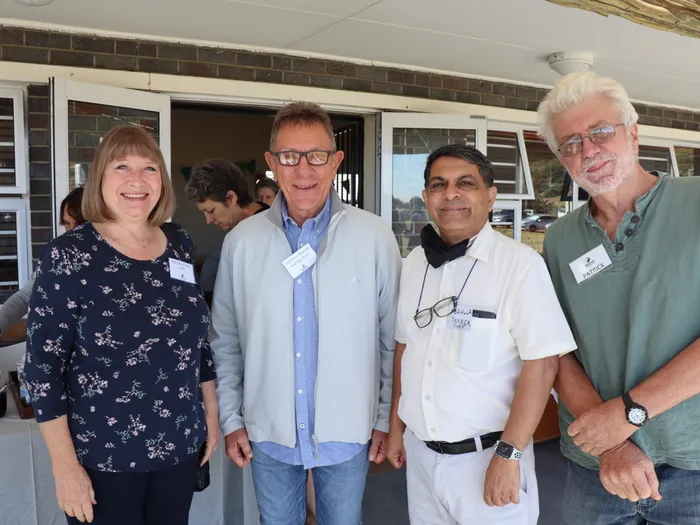Citizens must rally to tackle toxic rivers - scientist

Attending the Wessa meeting at Zandvlei, from left, are Professor Leslie Petrik of UWC, Wessa board member Janssen Davies, City of Cape Town manager of stormwater and sustainability Abdulla Parker and Wessa Western Cape chairman Patrick Dowling.
The state of South Africa’s rivers is a national disaster that needs urgent attention and citizen action, says Dr Jo Barnes from the faculty of medicine and health sciences at Stellenbosch University.
She was speaking at a meeting held on the banks of Zandvlei, in Muizenberg, on Saturday by the Wildlife and Environment Society of South Africa (Wessa), during Water Week, from Monday to Sunday March 21 to 27.
“Half the national treatment plants are in critical condition, and in some areas, there are no treatment plants, such as from Woodstock to Hout Bay,” said Dr Barnes.
Raw sewage - containing disease-causing organisms and a cocktail of synthetic chemicals, ingestion of which research linked to cancer in humans - was spewed daily into the ocean, she said.
“Western Cape rivers flow with household waste and disease, which, in turn, flows into the ocean.
“Plastic does not break down into nothing - it gets smaller, increasingly easy for ingestion by aquatic life.
“From a sample testing, more than 80% of us have plastic in our bodies. We need citizen action to put pressure on authorities.”
Wessa Western Cape chairman Patrick Dowling said the temporary closure of three of Cape Town's popular recreational vleis - Rietvlei, Zandvlei and Zeekoevlei - was among a long list of issues raised by civic organisations, activists and academics over past years.
“These prompted Wessa to try and pull the threads together to see how detailed understanding of the situation could possibly lead to a better co-ordinated and holistic response. It’s reassuring to hear of the City's determination to address the problems and work with civil society to do this. Constant vigilance, monitoring and follow-through actions will be needed to arrest and reverse a trend of degradation that has existed for decades,” said Mr Dowling.
Alex Lansdowne, chairman of the City's special committee on water quality in wetlands, said the municipality was addressing many of the water waste problems, but the “big ship will take several years to turn around”.
Abdulla Parker, manager of the City’s stormwater and sustainability branch, said the public could click on “report a fault” on the City’s website (capetown.gov.za) to alert the municipality to water problems.
Professor Leslie Petrik, from the faculty of chemistry at UWC, said that even the functioning water-processing plants no longer sufficiently reduced the overload of synthetic endocrine-disrupting chemicals and compounds.
Professor Petrik is a leading expert in environmental remediation, water treatment and beneficiation of industrial wastes.
“Not only do our officials not use the latest science of advanced oxidation to break down these chemicals so they cannot reassemble, but government uses a limited guideline for testing,” said Professor Petrik.
She added that concentration increased up the line, from background water, to small marine organisms, to small fish and to the large fish that we eat. The longer we left the problem, the more lethal it was. Also, aquatic animals were getting an un-researched mixture that Professor Petrik compared with “a person going into a pharmacy and eating from every shelf”. He added: “This mixture can and does come back to us.”
Wessa board member Janssen Davies said the meeting was perfectly timed given recent water pollution problems suffered by residents in various suburbs.
“It’s pleasing to see representatives from ratepayers’ associations and protected areas across Cape Town’s spectrum. It’s a constructive beginning for coordination of the efforts of civil society and the City of Cape Town, as well as accountability.”
